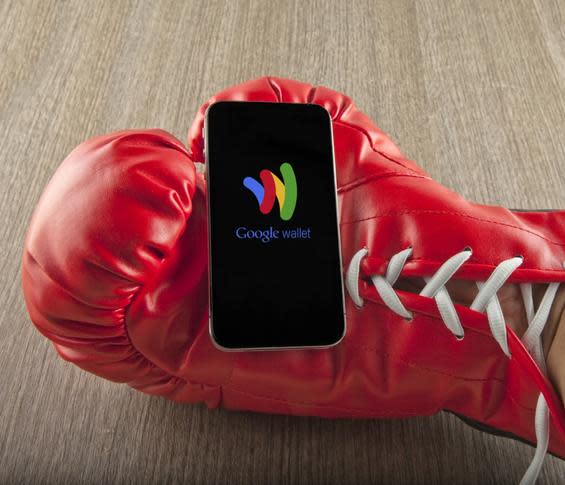Why Apple Pay won't be the death of Google Wallet

Image: iStockphoto/koufax73
In the mobile world, fewer technologies are more prominent right now than mobile payments that use near field communication (NFC).
NFC allows two devices with the technology to establish radio communication and exchange information. Commonly, this is used to allow smartphone users to purchase goods by sending payment information via NFC.
One of the biggest bumps in NFC popularity came from Apple's introduction of Apple Pay in October 2014. Google, however, introduced its own version of a mobile payment using NFC called Google Wallet back in 2011. The service was a hit with Google fans, but didn't initially take off with the general public.
"I would say probably, since it was introduced, it's been coasting," said Gartner analyst Penny Gillespie.
Google Wallet hasn't experienced any dramatic dips, nor has it seen any spikes in interest or use. As mobile takes over more of our daily lives, Google stands to benefit heavily from making Google Wallet the go-to mobile payment system. But, there are still a few challenges facing it.
According to Jordan McKee, an analyst at 451 Research, Google's primary challenge is its name. The search giant is just that, a search giant, so most of its revenue comes from advertising. McKee said this can make merchants wary of Google's intentions.
"Google is after data, and merchants remain hesitant to give that up," McKee said. "Many view working with Google as making a deal with the devil, fearing their data may be used against them for things like competitive offers."
Both Apple and Google said that they do not share your credit card number with merchants who accept their respective payment systems. Apple's FAQ states that users' credit card numbers aren't stored on the device or on Apple Servers, while Google only states that credit card numbers aren't shown in the app.
When it comes to what transaction data is stored, the Google Wallet FAQ states the following: "Google Wallet records information about your purchases, such as merchant, amount, date and time, method of payment, and, optionally, geolocation."
Apple's Apple Pay FAQ had the following: "Apple Pay retains anonymous transaction information such as approximate purchase amount. This information can't be tied back to you and never includes what you are buying."
These two different statements could just be splitting hairs, or two different ways of describing the same thing.
Another challenge facing all mobile payments systems, but Google Wallet especially, is a lack of education about mobile payments and NFC in general.
"We've had a lot of conversations in the analyst community, until the Apple Pay announcement, whether near field communication was actually dead, in the US anyway," Gillespie said.
The introduction of Apple Pay brought more attention to NFC and the concept of mobile payments. Still, that doesn't mean that Apple Pay immediately killed off any potential success for Google Pay.
Based on the research Gillespie has seen, Google Pay seems to have gotten a boost from the debut of Apple Pay. More consumers know what they can do with the technology and more retailers are starting to see the value in NFC technology.
There is still a ways to go when it comes to NFC, though, because it requires a great deal of updating to point-of-sale systems without a guaranteed return on investment.
"Merchants are not willing to spend great amounts for infrastructure changes to accommodate a payment method that a lot of consumers aren't ready, willing, and able to use," Gillespie said.
Likewise, she said, consumers aren't going to readily embrace a payment method that isn't known to be accepted by all retailers. This is partly why Starbucks went with QR readers when it implemented its mobile payment system. Starbucks already had the scanners to handle QR and there wasn't the cost associated with accepting NFC payments.
The good news for all NFC payment services, Gillespie noted, is the introduction of credit cards with EMV smart chips (credit cards that use a chip and PIN system as opposed to the magnetic stripe system) to the US. Both Visa and Mastercard have expressed a desire to see US retailers ready for EMV by October 2015. If retailers update their systems to handle EMV cards, it would make sense that they would go ahead and update the technology for NFC as well.
Outside of the NFC challenges, McKee said that Google Wallet is in the midst of an identity crisis as it tries to integrate a number of disparate components. However, Google has made some valuable changes to Wallet since its inception that could position it better with potential merchants.
"Google has done a nice job executing on an API-centric vision with the introduction of Google Wallet Objects and Google Wallet Instant Buy," McKee said. "Both have improved Google's merchant-facing value proposition and positioned its solution as more than just a credit card surrogate."
However Google seeks to improve Wallet, it's clear that its success will require continued investment in the Android ecosystem. As payments become a part of the OS, McKee said that Google has the opportunity to make Google Wallet the de facto payment system for the Android ecosystem. Both Google and its vendors will have to strengthen their focus on developers to make this happen.

